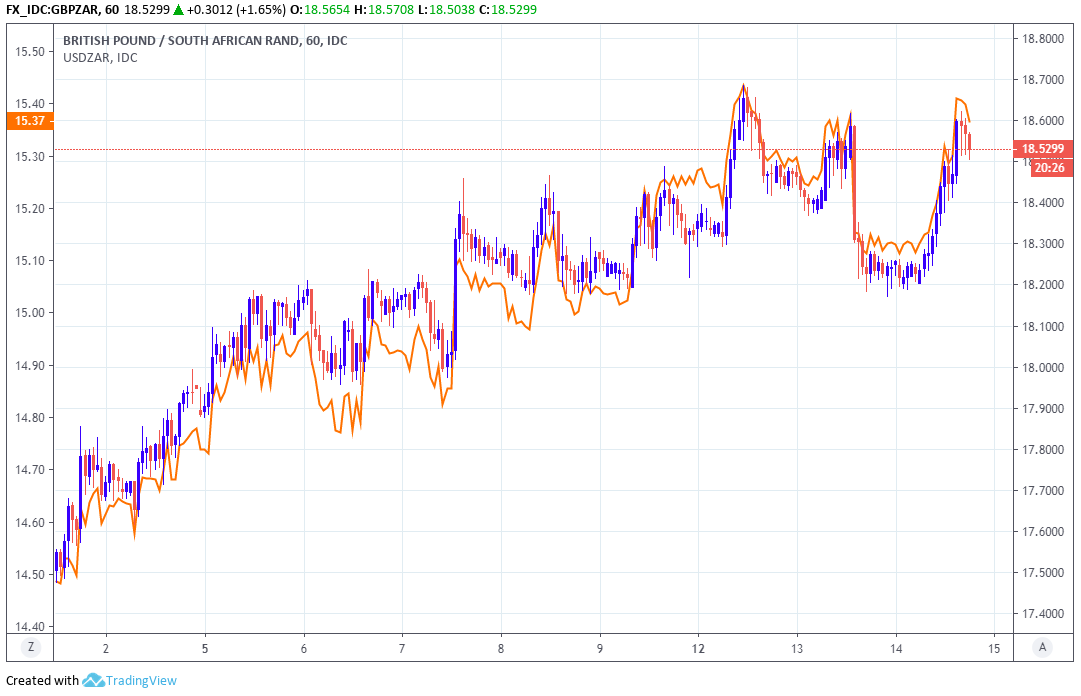The South African Rand Can Recover, Analysts Say, after Global Risk Sell Off Weighs
- Written by: James Skinner
-

© Lefteris Papaulakis, Adobe Images
- ZAR wounded in risk sell-off as fears for global economy rise.
- Slowing Chinese and German growth, U.S. yield curve at play.
- Global backdrop made worse for ZAR by Moody's rating fears.
- But Investec eyes final quarter recovery as the seasons turn.
The Rand was left wounded Wednesday after suffering heavy losses during another global sell-off in so-called risk assets, but analysts at Investec say the South African currency is likely to recover from recent losses once into the final quarter of the year.
South Africa's Rand slumped Wednesday alongside the price of oil and other commodities, as well as global stock markets, in a punishing sell-off that swept across the globe in response to dire Chinese and German economic figures. China's economy is struggling with increasing numbers of U.S. tariffs on the country's exports, industrial production and retail sales figures revealed Wednesday, and Germany's economy shrank in the second quarter in sympathy with its Chinese counterpart.
Wednesday's data suggests strongly that key parts of the global economy are headed for a rough patch that threatens to embroil countries further afield given the globalised nature of the goods trade and multinational interlinkages in corporate supply chains. This is bad news for South Africa, which has seen its economy contract once this year and is fighting an apparently losing budget battle to save its last remaining investment-grade credit rating.
"We got bad economic news out of China, more bad news out of Germany, even worse Industrial Production data for the Eurozone and an inversion in the 10s2s yield curve in the UK. This saw yesterday’s “risk-on” move start to unravel during the European morning, which brought back broad demand for USD. Then we got the headline that everybody’s been waiting for…the widely followed US 10s2s treasury curve has finally inverted," says Eric Bregar, head of FX strategy at Exchange Bank of Canada.

Above: GBP/ZAR rate shown at hourly intervals, alongside the USD/ZAR rate (orange line, left axis).
Bond markets in the U.S. are now signalling trouble ahead, but given the upset has roots elsewhere in the global economy and the Federal Reserve (Fed) interest rate is still the highest in the developed world, the safe-haven Dollar is benefitting from renewed flows of capital that is fleeing other parts of the world that are perceived as being more risky.
South Africa is one of those places, with foreigners reported by News 24 on Wednesday to be dumping around R2bn of the government's bonds each day. Outflows are putting pressure on government bond prices and lifting their 'yields' in the process, which is bad news for the Rand because the USD/ZAR rate tends to follow the 10-year South African government bond yield.
Annabel Bishop, chief economist at Investec Bank, says the impact of these factors on the Rand and other assets is being made worse by the summer holiday season, which tends to see volumes and activity in the financial industry fall off as many money managers go on leave.
This leads to thin trading conditions in which even relatively small orders on the wholesale markets can impact prices.
"The third quarter of each year is typically one in which global financial markets see the most elevation in risk aversion, particularly August, the key month in the Northern hemisphere summer period. September then tends to see significant market churn, often with increasing rand strength through the fourth quarter and the new year," Bishop says. "We continue to believe the negative market reaction over the latest US-Sino trade spat increases the chance for further cuts in the fed funds rate this year."
Above:USD/ZAR rate shown at daily intervals, alongside 10-year ZA bond yield (orange line, left axis).
Foreigners are fleeing the South African bond market not only because they fear for the health and prospects of the global economy, but also because the government is mired in a losing battle to eliminate its budget deficit as part of an effort the save its top credit rating.
A meaningful portion of those bond investors will be barred from owning South African government bonds if Moody's does as some say that it might, and downgrades the country's debt to 'junk' upon its next review in November.
Any loss of the credit rating and the resulting bond sales might put severe pressure on the Rand. In order to avoid that outcome, South Africa's government needs to formulate a credible plan for righting the finances of the capsized ship that is the national power utility Eskom. The economy also needs a pickup in growth too, but this is made less likely by the worsening condition of the global economy. Nonetheless, Investec's Bishop says a change of the seasons could usher in a recovery for the Rand.
"The last, and first, quarters of the calendar year usually sees EM currencies strengthen as many northern hemisphere market players return from vacation and riskier, higher yielding assets typically return to favour. The rand could strengthen by a substantial amount in Q4.19 on this seasonal effect, and in Q1.20," Bishop writes, in a research note.
Bishop forecasts the Rand will finish the third quarter at 13.30, down from 15.37 Wednesday. The Pound-to-Rand rate is seen declining from 18.53 to 17.87.
Above: Investec exchange rate forecasts.
Time to move your money? Get 3-5% more currency than your bank would offer by using the services of foreign exchange specialists at RationalFX. A specialist broker can deliver you an exchange rate closer to the real market rate, thereby saving you substantial quantities of currency. Find out more here. * Advertisement
